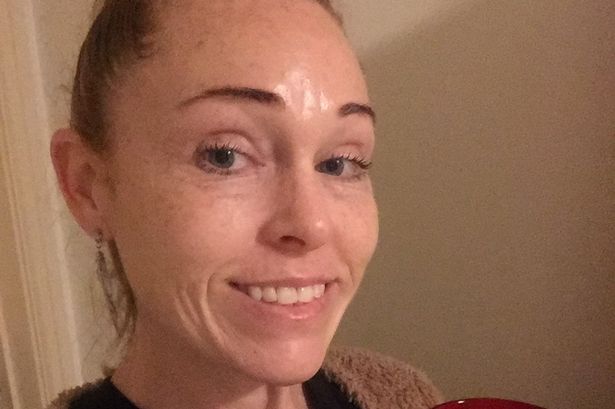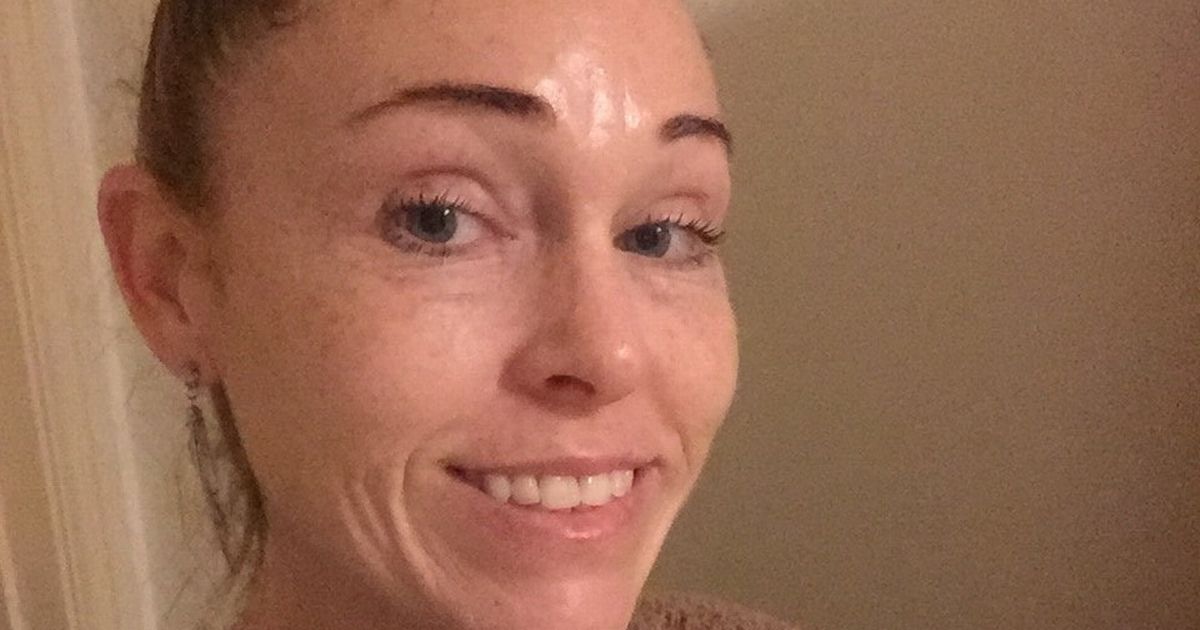Terrilyn Griffiths, 44, was teaching her ex-partner’s kids a standing bridge pose when she first injured her back in July 2021 Terrilyn shares the same rare health condiition as Blue’s Duncan James(Image: Terrilyn Griffiths / SWNS)
Terrilyn shares the same rare health condiition as Blue’s Duncan James(Image: Terrilyn Griffiths / SWNS)
A woman has been warned she could develop a rare spinal disorder after a yoga pose resulted in slipped discs in her back. Terrilyn Griffiths, 44, was showing her ex-partner’s children how to perform a standing bridge when she first injured her back in July 2021.
Initially, she “thought nothing of it”, but two weeks later, she started suffering from back pain, often feeling as if she “would collapse at the waist”. For six months, Terrilyn endured the pain until it eventually subsided, leading her to believe it had “healed on its own”.
However, when she said she lightly set down a bag in June 2023, she was left in excruciating pain and has since been plagued by chronic back pain, loss of bladder control and an inability to walk long distances. In January 2024, Terrilyn finally sought medical advice and was told she showed early signs of cauda equina syndrome (CES) – a condition affecting the nerves in the lower back – after an MRI scan revealed she had slipped discs in her back.
She was referred to a physiotherapist, but claims “nothing has helped” as she is not eligible for a discectomy due to the absence of any ‘red flag symptoms’ of the condition. Blue band member Duncan James was diagnosed with CES in 2016 following a slipped disc and underwent surgery. He said that the condition could have resulted in paralysis, but instead led to permanent loss of sensation in his left leg – a reality he will have to cope with for the rest of his life.
Terrilyn, who is confined to her home in Lowestoft, Suffolk after working in a factory, said: “CES is traumatic and life-changing.” She empathised with Duncan James’ struggle, saying: “I understand the pain that Duncan James has experienced, and it’s not easy.”
Lack of knowledge of CES condition
The lack of widespread understanding about the condition has made her journey to obtain proper treatment more difficult. She said: “Not many people seem to know much about it, which has made getting the right treatment harder.
“And now it has taken my life away. I feel as if there’s little hope for me in the future.”
An MRI in January 2024 revealed early signs of cauda equina syndrome with slipped discs, following multiple back injuries dating back to a yoga incident in July 2021. Recalling the incident, she explained: “I was showing my ex’s kids how to do a standing bridge pose when my back gave way”.
Initially, she did not experience pain, but it set in two weeks later. Despite this, she persevered: “The pain didn’t start immediately, but two weeks later, when the pain started, I was just powering through.”
She said her strenuous job exacerbated the issue, as she had to lug heavy materials throughout the day. She said: “It didn’t help that I worked a laborious job too, and I had to carry heavy materials around all day.”
The pain was gone and then it came back
Six months after the initial injury, she thought the pain was gone until it returned in June 2023, right before a horse-riding lesson, triggered again by a seemingly benign activity. “I had a physical week at work, and my back went right before I had a riding lesson,” she recounted.
Seeking medical attention, she ended up disappointed, with the response allegedly being limited to physiotherapy arrangements. “I went to the doctor straight away, but all they did was set me up with physio,” she said.
Despite committing to nine months of light exercises with her physiotherapist, her back pain intensified rather than improved. In January 2024, her consultation with a locum doctor led to an MRI referral that revealed disc prolapses and nerve compression, including at the cauda equina nerve roots, yet she only received a “partial” diagnosis.
“It wasn’t the full syndrome they believed I had,” she recalled. “So I wasn’t eligible for surgery or any invasive treatment.
“And again, I was referred back to the physio, because I didn’t present with any ‘red flag’ symptoms.”
CES symptoms she encountered
Experiencing a range of symptoms, such as dexterity issues in her hands, weakness in her hip and groin area, altered sensation in the saddle region, and a semi-paralysed bladder, the 44 year old’s condition was deeply affecting her life. She found herself able to go up to a full day without urinating, which happened during a festival in June 2024, and faced challenges in climbing even one flight of stairs due to pins and needles, making it difficult for her to walk properly.
“Every time I walk, I sway side to side and people think I’m drunk,” she expressed. “I was losing my capacity to do the things I love; I couldn’t go on hikes or even do my food shop in person.
“I even have a tool to help me open cans, but the doctors still did little about it.” Terrilyn claims to have visited A&E three times between June and August 2024, each time being told by hospital staff that her “symptoms were serious enough for surgery” resulting in her being prescribed opioid pain patches and additional physiotherapy sessions.
Despite achieving “some success” with pain management, Terrilyn has been unable to work for two years and is confined to her home. Everyday tasks have become a monumental challenge, and she struggles to walk without stumbling or falling.
“I was given a cane from the hospital, and I’m embarrassed to be seen with it,” she confessed. “I’m only 44 years old and this is how my life will look from now on.”
The NHS warns that if the condition isn’t addressed promptly, it can lead to life-altering injuries. Terrilyn is currently fundraising for private consultations, travel costs and home support, with donations exceeding £1,000 so far.
“I have started looking into getting the surgical procedure elsewhere – maybe abroad – to decompress the area,” she revealed. “But I wish more people were more aware of incomplete and partial cauda equina syndrome.
“Perhaps things would have been different for me.” Donate to Terrilyn here.
